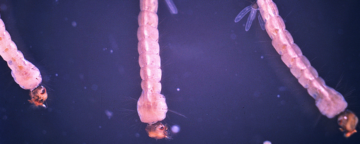Most Floridians favor the use of genetically modified mosquitoes to fight the spread of Zika virus and are significantly more likely to approve of it than people who live outside Florida, the Annenberg Science Knowledge survey has found.


Michael Rozansky has worked as an editor, writer and reporter for 30 years. Before joining the Annenberg Public Policy Center as director of communications, he spent more than 20 years at the Philadelphia Inquirer, most recently supervising its arts and entertainment coverage. He has reported on the arts, media, business, politics, national and regulatory issues. Rozansky also developed and taught a class at Temple University on the history and practice of celebrity journalism. He received a bachelor’s degree in English and American literature from Brown University and a master’s degree in journalism from Columbia University’s Graduate School of Journalism.

Most Floridians favor the use of genetically modified mosquitoes to fight the spread of Zika virus and are significantly more likely to approve of it than people who live outside Florida, the Annenberg Science Knowledge survey has found.

Washington Post Executive Editor Marty Baron will talk about the media and policy change with APPC Director Kathleen Hall Jamieson in an event sponsored by the Fels Institute of Government.

Floridians see themselves at greater risk of being infected with Zika compared with other people nationally, and more Floridians than non-Florida residents have takening steps to protect themselves, an APPC survey finds.

Many Americans hold mistaken beliefs about Zika virus. To help provide the public with accurate information, the policy center has released a free "A Guide to Effective Zika Coverage" for writers, editors, reporters and broadcasters.

A new mandatory food-labeling law allows food producers to use digital codes to inform consumers that food contains genetically modified (GM) ingredients. But will consumers use smartphones or in-store readers to scan those QR codes?

Although most Americans are familiar with news reports about Zika virus, more than three-quarters of them say they haven’t done anything in the last three months to protect themselves from getting infected, a new APPC survey found.

APPC director Kathleen Hall Jamieson addressed the annual meeting of the Midwestern Legislative Conference, in Milwaukee, on "Effective Communication in a Polarized Environment."

There's widespread support for labeling genetically modified foods, as required in a new bill President Obama is expected to sign. But most Americans don't know that scientists have found no substantiated evidence to show that genetically modified foods are unsafe.

What do citizens want from their member of Congress? The answer, a new study finds, is partisan representation on national issues, which is more highly valued today than constituency service or bringing in federal money to a congressional district.

As some athletes say that they are pulling out of the summer Olympic Games in Brazil because of concerns about Zika virus, most Americans favor the idea that the Games should be cancelled, postponed or moved to another country.